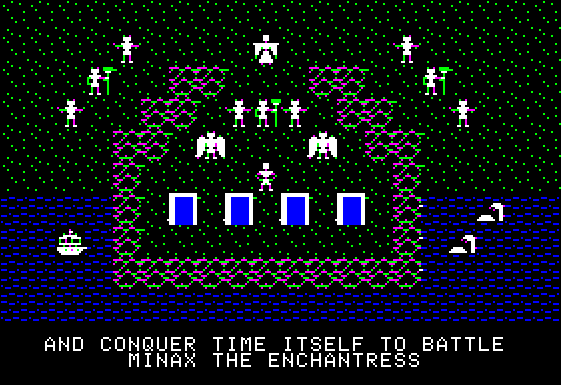-
Welcome to rpgcodex.net, a site dedicated to discussing computer based role-playing games in a free and open fashion. We're less strict than other forums, but please refer to the rules.
"This message is awaiting moderator approval": All new users must pass through our moderation queue before they will be able to post normally. Until your account has "passed" your posts will only be visible to yourself (and moderators) until they are approved. Give us a week to get around to approving / deleting / ignoring your mundane opinion on crap before hassling us about it. Once you have passed the moderation period (think of it as a test), you will be able to post normally, just like all the other retards.
You are using an out of date browser. It may not display this or other websites correctly.
You should upgrade or use an alternative browser.
You should upgrade or use an alternative browser.
The Codex’s Best Computer RPGs (pre-Diablo)
- Thread starter Deuce Traveler
- Start date
Have played only a fraction of these while understanding english 

Glad
Literate
- Joined
- Jun 20, 2021
- Messages
- 23
There is a typo in the game's name in the list - it says "Moonstone: A Hard Days Night" - it should be "Moonstone: A Hard Days Knight"
I would have given it a full 10 points if I could, since it's the best game I played on amiga.
5 points
Moonstone: A Hard Days Knight
5 points
The Elder Scrolls II: Daggerfall
I would have given it a full 10 points if I could, since it's the best game I played on amiga.
5 points
Moonstone: A Hard Days Knight
5 points
The Elder Scrolls II: Daggerfall
Thal
Prophet
- Joined
- Apr 4, 2015
- Messages
- 419
It's interesting that Ultima IV consistently ranks as more popular here than Ultima V (which hasn't got any points so far). Ultima IV was more groundbreaking, but V plays a whole lot better. The Ultima games changed so much with each installment, but in a lot of ways V feels like they wanted to refine the gameplay of IV before moving on.
Especially with a poll of this type, people don't really choose best games from the list, but best games out of the small pool of games that they have actually played. My guess is that by now, more people have played Ultima IV than V for various reasons. Also many prefer to reward groundbreaking games over their sequels, even if the latter is somewhat better, since the first game was objectively a greater achievement, due to not having a foundation to build upon.

- Joined
- Jun 28, 2017
- Messages
- 31,774
"Back in my day all games looked like this and we loved it! Damn kids these days!"


4 points:
World of Xeen
3 points:
Darklands
1 point:
Betrayal at Krondor
Dark Sun: Shattered Lands
Lands of Lore: The Throne of Chaos
World of Xeen
Tagging Darth Roxor to trigger him. Non-fake fake edit: WAIT, HE GAVE IT TWO POINTS?? Saved for posterity.
Darklands
1 point:
Betrayal at Krondor
Dark Sun: Shattered Lands
Lands of Lore: The Throne of Chaos
Last edited:
I may have to edit my post and give 5 points to MM3 to counter the Xeenfags. I genuinely think it's the better game, and it laid the foundation for the Xeen duology.
Tagging @Darth Roxor to trigger him
i dont get it
See my non-fake fake edit. You're always posting that wiz/MM-meme so I'm surprised you put WoX highest.
also 5 games nigga lern2count
Yeah I missed that, urgh. SO HARD
See my non-fake fake edit. You're always posting that wiz/MM-meme so I'm surprised you put WoX highest.
i've always expressed nothing but praise for xeen, it's one of my all time favs probably
and it's so high only because wizardry 8 is not on the list
Parsifarka
Arcane
Three points to each of these three:
Isles of Terra
World of Xeen
Swords of Xeen
Oh, and the last one to Wizardry 7.
Sorry, this is who I am.
Isles of Terra
World of Xeen
Swords of Xeen
Oh, and the last one to Wizardry 7.
Sorry, this is who I am.
(5) Betrayal at Krondor
(3) Star Control 2: The Ur-Quan Masters
(2) Darklands
(3) Star Control 2: The Ur-Quan Masters
(2) Darklands
Somewhat echoing Lord_Potato here, but the inclusion of Star Control 2 on an RPG-list drew criticism back when Felipepepe did it, and I for one am criticizing it now. A core design idea behind Star Control 2 was to have it defy all categorization. It's not a shoot'em-up, nor an RPG, dating simulator or sandbox experience... it's a hybrid of them all, and more.
It doesn't seem to matter though, as only Binky has voted for it, but I'm hoping he reconsiders and that no one else puts down a vote for it.
Star Control 2 is a brilliant game... but it's not an RPG.
My votes will be coming in a later post.
Yeah, I'm conflicted on it, too. Difficult to call it an RPG, but I love it so. I may have to edit my vote.
DJOGamer PT
Arcane
EDIT:
Realms of Arkania: Star Trail - 5 points
Also 1 point each:
Dark Sun Shattered Lands
Ultima Underworld
Realms of Arkania: Star Trail - 5 points
Your rules are bullshit OP
Fuck you very much
Fuck you very much
Also 1 point each:
Dark Sun Shattered Lands
Ultima Underworld
Last edited:
SHOULD I REMOVE DARK SUN AND ADD CURSE OF AZURE BONDS
CODEX HELP ME
CODEX HELP ME
- Joined
- Jun 21, 2018
- Messages
- 4,241

Oh, and one addendum: Much like in the last poll, I would have voted for Star Control 2 if it were an RPG.
Which it is NOT.
Which it is NOT.
BruceVC
Magister
What would be your reasons for this excellent score, I see other members also rated this game. I have never played this game before but I checked now and on Steam the entire Realms of Arkania bundle is 60% offRealms of Arkania: Star Trail - 10 points
- Joined
- Jan 16, 2018
- Messages
- 2,863


5 Dungeon Master
3 Daggerfall
2 Shadows over Riva (because DSA and also, well, yes.)
3 Daggerfall
2 Shadows over Riva (because DSA and also, well, yes.)
rusty_shackleford
Arcane
- Joined
- Jan 14, 2018
- Messages
- 50,754

You know it when you see it.
DJOGamer PT
Arcane
What would be your reasons
The reason is simple
I was going to vote in other games as well, but then I noticed that while those games had people voting them left and right, Star Trail barely had any votes
So I decided to go all in on it
BruceVC
Magister
One vital thought I had in mind when allocating these points, was to take into account the 'core' of these older RPGs, and how it's changed from later, more robust RPGs. A large majority of the games listed are just battle simulators using a detailed (and often slow-paced) combat system. Basic concepts such as dialogue, branching plotlines and multiple pathways through the games that we take for granted today simply weren't available, except in very basic terms. Even re-playing the game with different builds is not accepted for many of these games, the focus is on having the player build the perfect party of adventurers to reach the end of the game.
With that said, I also take into account games that are fun to play, raised the bar or are generally notable in the field of RPGs (or gaming as a whole).
Finally, I object to only 10 points being allowed, with all these restrictions in place. More would be needed to do this proper justice.
---
My 10 points, in chronological order:
# 3 points to Ultima 4: Quest for the Avatar, for daring to buck the trend. Instead of the player raising a party of murderhobos in strength so that they can take down the Big Bad, the player must instead grow his character to become a better person, so that he can help the game world deal with its socio-spiritual problems.
# 3 points to Eye of the Beholder (1), for providing a good all-round approachable RPG experience and being very free-form in its design. Almost every party build has a chance of success, and there are multiple paths available in traversing the dungeon.
# 4 points to Ultima Underworld: The Stygian Abyss, for daring to be. It didn't just raise the bar, it redefined it along the way, setting new standards for the years ahead.
This entire thread has been very interesting for me because I only restarted gaming in 2007 and missed out on playing most older RPG like Ultima, Wizardry and M&M. But all the posts scoring best games allows you to see patterns of general excellence that many of the lists share so it just reminds of what older games to play first
And your post gets additional credit because you provide a brief description that also helps with understanding why this game is good
























